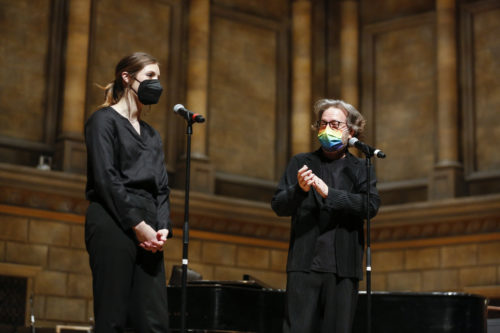“A lot of you are not meant to watch me, you’re meant to go in your own flow,” says Georgia Mills, a doctoral contemporary conducting candidate at the Eastman School of Music, to Eastman’s Musica Nova ensemble during a recent rehearsal.
The work, Ligeti’s Chamber Concerto, a seminal work of the twentieth century, expands and contracts time and space using a technique Ligeti called “micropolyphony,” a twentieth century reimagination of the baroque pitch polyphony of Bach. Mills—a female in a largely male-dominated concentration, especially within new music—expresses the work’s tricky rhythms and quirky accents through dips of her shoulders as much as through her precise arm movements. It’s the kind of work that requires a conductor to divide their brains into several tracks to keep the disjunctive instrumental parts together.
Mills will lead both a 30-minute lecture and performance of Ligeti’s Chamber Concerto on the upcoming Musica Nova concert on Friday, April 7 at 7:30 p.m. in Kilbourn Hall. The concert is the culmination of a long path to conducting that started with anything but praise.
“I had a few negative experiences with conducting, people discouraging me in some ways, or in one case, telling me I should quit altogether,” says Mills.
She was relaying the story of a being told she should lay off of conducting while at the Bang on a Can Festival, where she was performing as a pianist, when Brad Lubman, Musica Nova’s music director and a professor at Eastman, overheard. Suspicious, he set up a lesson with her a few days later.
After watching 20 seconds of a video of her conducting, he said, “True, you’re just starting out. And we all have study that we need to do to improve. But never let anyone ever tell you should not conduct because I saw a very natural technique.” Lubman also says that he picks up on people’s auras, “and I sensed here was a really fine musician and wonderful personality.”
“He saw a lot of potential in me as a strong performer moving into the conducting world because a lot of his approach is about what is the clearest way to show instrumentalists time clarity, for playing together and facilitating different instrumentalists,” says Mills. “He definitely saw something in me that these other people weren’t seeing.”
It was a relief to Mills. She started conducting at her church growing up, which she expanded on by conducting friends through her undergraduate degree in piano at New York University and then as an apprentice conductor with the New York Youth Symphony. She felt it brought together her many musical threads as a pianist, cellist, and singer.
“Something about leading other musicians felt like I was taking my background with all these different areas of the arts and putting it towards being a visionary in the field,” she said. “I love the idea of being on the other side performing.”
Because Lubman was at Eastman, Mills decided to apply, but first as a master’s student in music leadership. She went through the degree, all the while studying privately with Lubman and taking conducting courses. By the end, her path was clear: she wanted to be a conductor. She received her master’s degree in conducting in 2021 and went on to the doctoral program, all under Lubman’s tutelage.

Georgia Mills receiving applause from Brad Lubman during an Eastman Opens the Doors concert in March, 2022. Photo by Matt Wittmeyer.
Lubman says that Mills is adept at assimilating technique, but is also a deep thinker, and that there’s a special chemistry when she’s in front of an ensemble. He calls her a superstar conductor.
“During her time studying with me, Georgia Mills has become an outstanding conductor,” he says. “Not just in terms of her conducting technique, which is excellent, but also in her ability to create a very positive, yet efficient and musical atmosphere, building a great rapport with any ensemble with whom she works.”
Mills is already conducting professionally: In February, she led the Orlando Philharmonic as a cover conductor in a performance of Bernstein’s Candide, and will conduct a full concert with the orchestra next season. In March, she conducted the [Switch~ Ensemble] in Buffalo. Later this year, in December, she’ll conduct the Grossman Ensemble in Chicago. And she’s already stood in for Lubman, leading his Signal Ensemble, a professional new music group, when he was ill this past year. She’ll continue guest conducting and hopes to follow in Lubman’s footsteps and someday start her own contemporary music ensemble.
Friday’s Musica Nova concert is one of Mills’ final requirements for the DMA. She’ll give a survey of Ligeti’s works, drawing on Ligeti’s background as an isolated Hungarian Jew during World War II, and explain Ligeti’s micropolyphony in more detail. In the talk, she’ll share audio examples and Musica Nova will help demonstrate concepts with music from the Chamber Concerto.
The other works on the program include Webern’s Five Pieces for Orchestra, conducted by doctoral candidate Luke Poeppel, and Lachenmann’s Mouvement (-vor der Erstarrung), led by Lubman. The concert is free and open to the public.
-Written by Anna Reguero, Senior Writer and Editorial Manager
Top photo: Credit rechord.co (Andrew Hammond & Ali Rose Hotz)

